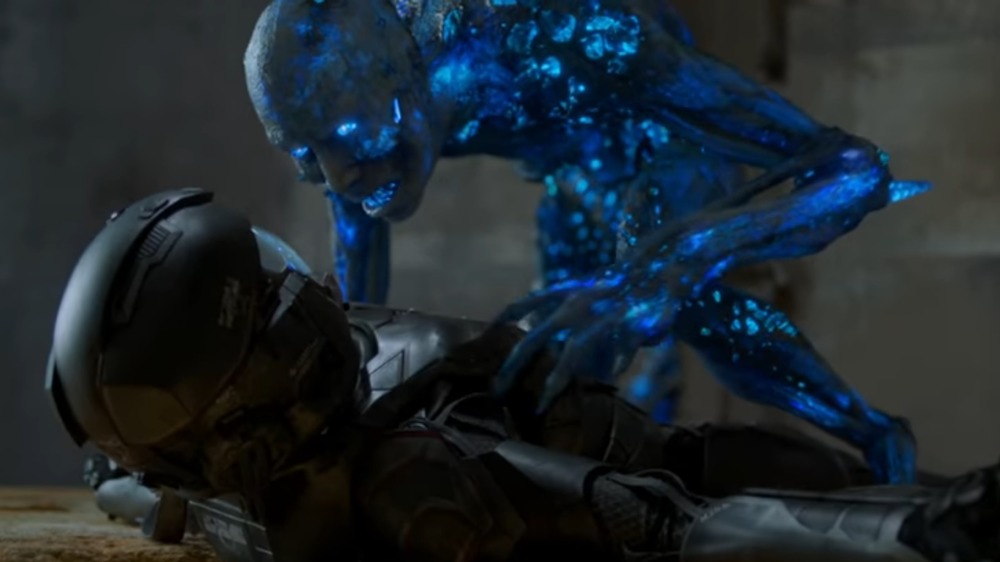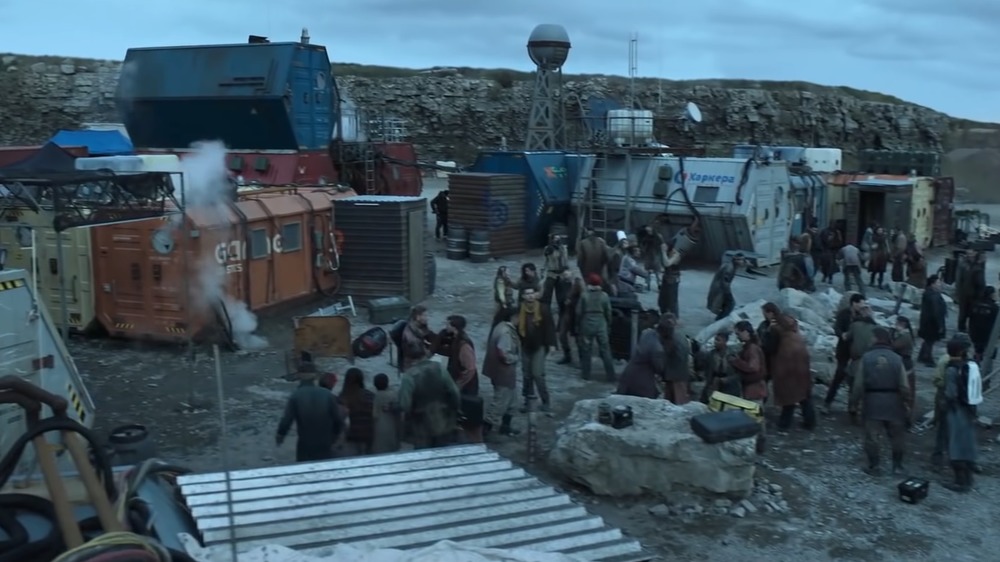Why The Expanse Seems To Predict The Future
This content was paid for by New York Comic Con and created by Looper.
"Those who cannot remember the past are doomed to repeat it" is a saying that is both overused, and yet rarely taken to heart. The sentiment is at the core of Amazon Prime Video's The Expanse, a sci-fi series set several hundred years in the future when humans have colonized the furthest reaches of our solar system. Although the show is full of futuristic technology and space travel, humanity itself is mired in the same troubles it always has been. Wars for independence, conflicts over resources, and mysterious existential threats abound. The show might take place many generations beyond our own, but it often feels like the future it's predicting is one that is just days away.
The show is an adaptation of the Hugo Award-winning series of novels by James S.A. Corey, a pseudonym for the co-authors Daniel Abraham and Ty Franck. For them, creating a vision of the future that feels eerily accurate doesn't take some kind of supernatural predictive power. While doing a virtual panel for New York Comic Con 2020, Abraham and Franck were asked about why The Expanse feels so prescient.
Franck explained, "we tend to write about things we've read about in history and we try to drag those things forward. What we've realized is that humans do the same dumb stuff over and over and over again, so if you write about some stupid thing humans did three-thousand years ago, there's a pretty good chance somebody's doing it today."
Here's how The Expanse looks to the past to create its authentic vision of the future.
The story of The Expanse is ancient
The scope of The Expanse is, well, expansive. But one of the ties that bind the various narrative threads together is that it's a story about human exploration and colonization.
Humanity has been embarking on projects of colonization since our earliest days. While some artistic depictions of futurism portray humanity's push into the far reaches of space as a communal and almost utopian effort, that's rarely how it's happened in the past. Colonialism is a greedy, messy, and violent affair, and that's how it's portrayed on The Expanse.
In the world of the show, Earth may be the origin of human life, but it's not the homeworld for many humans, as colonization of the solar system has been happening for several generations. The relationship between Earth and the various independent governments and colonies of the solar system feels akin to the relationship between Europe and the Americas in the 18th and 19th centuries. There are struggles for independence, conflicts over resources, and atrocities committed in the name of freedom. And it feels like our future, because it looks like our past. Before it was the Americas, it was the Roman Empire, and so on.
And humans aren't the only species participating in colonialism in The Expanse. Early in the series, an alien scourge called the protomolecule is introduced, which is able to infect and alter organic life. In an interview with Scientific American, Franck was asked about the concept of the protomolecule, and he explained, "I was thinking about colonization and how the best way to colonize other planets is to build nanomachines and throw them at other solar systems."
The out-of-control alien entity is also an example of another way in which the series uses our past to illuminate the future.
The Expanse uses existential threats to show how humanity adapts
While talking about the protomolecule with Scientific American, Franck noted that it serves an additional narrative purpose: "You want to set your story in a place where things are being shaken out. It's why disaster movies are so popular. The protomolecule is our volcano...The story we're telling is the fallout and the new order the humans will set up."
The protomolecule represents a major existential threat to humanity, not unlike the many we've faced throughout our relatively short existence. Whether it's the bubonic plague or COVID-19, these disasters and how we react to them have often marked major turning points in our history. At the end of season 3, the threat from the protomolecule has mostly been mitigated, but it has already changed humanity all over the solar system. UN Secretary-General Chrisjen Avasarala (Shohreh Aghdashloo) tries to restrict travel to the further reaches of the universe, warning that an abundance of caution is necessary in light of the discovery of the protomolecule. But others have already begun the push, and the consequences of their actions reverberate across humanity in very real ways.
Even in space, humanity is interconnected
In the series, Mars has a large population and has already successfully declared independence from Earth, akin to the United States declaring independence from Great Britain. Moreover, Mars is known for its advances in technology and the ongoing efforts to terraform the planet. However, in season 4, after humans have begun traveling through a recently discovered intergalactic hub to other solar systems, we see that Mars is in decline. The promise of potentially thousands of inhabitable planets within reach makes the idea of spending generations trying to terraform Mars less appealing. Martians leave the planet, the economy goes south, gangs and black markets spring up to fill in the gaps left by skyrocketing unemployment, and, in general, life on the planet changes inexorably.
This is, of course, nothing new for humanity. During an interview with Geek Wire, Abraham spoke to exploring this kind of complex interconnectivity in The Expanse. He explained, "what happens when a new technology or a new discovery changes the balance of power? That's happened a lot. It happened when we found the New World. It happened when we invented refrigerated cargo ships, and all of a sudden, land-based nobility in Europe collapsed because you can get all of your food cheaper from South America."
He went on to add that because he and Franck replicate those patterns in their books, "we wind up looking weirdly prescient."
The storylines of The Expanse are repeating human history
Those seeking an easier life for themselves in the newly opened corners of the universe may be traveling on futuristic space ships, but they're still acting on an ancient impulse. People have been migrating forever. It's why there are humans in South Africa and Greenland, New Zealand and Patagonia. Sometimes the migration is driven by the hope of a better life, and other times refugee crises are created by conflict or famine. Most recently, wars and societal unrest in places like the Middle East and Central America have caused millions to flee their home countries because they no longer believe they have a future there.
This, too, is something Abraham and Franck thought about when writing The Expanse. In his interview with Geek Wire, Abraham noted that the series' tackling of the issue isn't because they predicted our current refugee crises, but because it's an "evergreen problem." He said, "It looks like we're talking about what's going on today, even though we wrote it eight years ago, because it's something that humanity revisits and revisits."
Or, as Abraham put it during the NYCC interview, "One of the things, I think, that has come out of the whole project is the idea that technology changes a lot and changes dramatically...but humans don't really change that much."
Season 5 of The Expanse premieres December 16.



